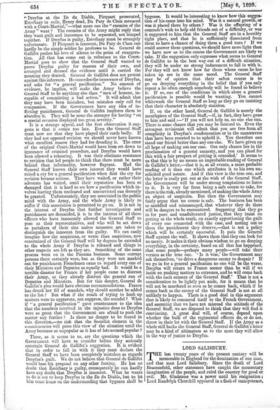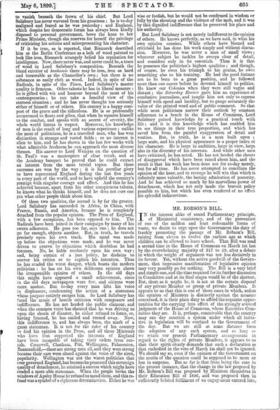LORD SALISBURY.
THE last twenty years of the present century will be memorable in England for the domination of one man, and that man Lord Salisbury. Since the death of Lord Beaconsfield, other statesmen have caught the momentary imagination of the people, and ruled the country for good or. evil. Mr. Gladstone was a power until his resignation ; Lord Randolph Churchill appeared in a flash of omnipotence, to vanish beneath the frown of his chief. But Lord Salisbury has never wavered from his greatness ; he is to-day maligned and feared as he was yesterday ; and England, which despite her democratic forms has always been kindly disposed to personal government, bows the knee to her Prime Minister, though she reserves for herself the privilege of criticising his actions and misrepresenting his character.
If it be true, as is reported, that Bismarck described him at the Berlin Conference as a lath of wood painted to look like iron, Bismarck strangely belied his reputation for intelligence. Now, there never was, and never could be, a trace of wood in Lord Salisbury's composition. Beneath the bland exterior of bonhomie there may be iron, iron as hard and inexorable as the Chancellor's own ; but there is no substance so easily cleft as wood. Indeed, in spite of the Radicals, in spite of the Times, Lord Salisbury's master quality is firmness. Other talents he has in liberal measure : he is gifted with wit and humour beyond the most of his contemporaries ; he can take a fanciful view of the sternest situation ; and he has never thought too seriously either of himself or of others. His oratory is a happy com- post of the grave and the ridiculous. He is so profoundly accustomed to flouts and gibes, that when he squares himself to the combat, and speaks with an accent of severity, the whole world listens in respect. Moreover, his knowledge of men is the result of long and various experience ; unlike the most of politicians, he is a travelled man, who has won distinction in strange and varied fields ; EO no interest is alien to him, and he has shown in the last few weeks with what admirable freshness he can approach the most diverse themes. His answer to Lord Wemyss on the question of St. Paul's was a masterpiece of clear retort, and at the Academy banquet he proved that he could extract an interett from the most trivial topics. But these successes are won by the way : it is his peculiar glory to have represented England during the last five years in every part of the world, and to have upheld the country's prestige with singular courage and effect. And this he has achieved because, apart from his other conspicuous talents, he knows what he thinks himself, and he does not care one pin what other people think about him.
Of these two qualities, the second is by far the greater. Lord Salisbury has succeeded in Africa, in China, with France, Russia, and America, because he is completely detached from the popular opinion. The Press of England, with a few exceptions has been opposed to him. The Radicals have been joined in their campaign by many of his sworn adherents. He goes too far, says one ; he does not go far enough, Objects another. But, in truth, he travels precisely upon his own track. His mind was made up before the objections were made, and he was never driven to swerve by objections which doubtless he had foreseen. No, he holds resolutely upon his own way ; and, being certain of a just policy, he disdains to answer his critics or to explain his intention. Thus he has evaded the worst danger, which besets the modern politician : he has set his own deliberate opinion above the irresponsible opinion of others. In the old days this might have appeared a small achievement, since in the old days newspapers were few, and citizens were more modest. But to-day every man lifts his voice in displeasure, condemning the action of a statesman whose purpose entirely escapes him. So Lord Salisbury has faced the music of hostile criticism with composure and indifference. He has not heeded the public clamour, and when the common voice has shouted that he was driving us upon the shoals of disaster, he either refused to listen, or, having listened, he has smiled and turned away. Now, this indifference is, and has always been, the mark of a great statesman. It is not for the ruler of his country to find his opinion in the Press, and all those Ministers who have best supported the interests of England have been incapable of taking their orders from out- side. Cromwell, Chatham, Pitt, Welling-ton, Palmerston, Beaconsfield,—these are strong men all, and they were strong because their ears were closed against the voice of the siren, popularity. Wellington was not the wisest politician that ever governed Englatd, but because he possessed this sovereign quality of detachment, he attained a success which might have evaded a more able Statesman. When the people broke the windows of Apsley House he refused to mend them, and this re- fusal was a symbol of a righteous determination. Either he was wise or foolish, but he would not be confirmed in wisdom or folly by the shouting and the violence of the mob, and it was by this dignified indifference that he preserved his place and his authority.
But Lord Salisbury is not merely indifferent to the opinion of others. He knows perfectly, as we have said, in what his own opinion consists. While others have blamed and criticised he has done his work simply and without discus- sion. Moreover, he was never a man of Small views ; whatever subject he tackles he sweeps clear of detail, and considers only in its essentials. Thus it is that he possesses the politician's highest qualities ; and though, of course, he owes his triumph to his genius, he ores something also to his training. He had the good fortune not to be born to a great position, and he followed more than one career before he devoted himself to politics. He knew our Colonies when they were still vague and distant ; the &dards!, Review gave him an experience of combative journalism, and taught him not only to express himself with speed and lucidity, but to gauge accurately the value of the printed word and of _public comment. So that while most politicians narrow their outlook by constant adherence to a bench in the House of Commons, Lord Salisbury gained knowledge by a practical touch with life ; and it is this knowledge which has enabled him to see things in their true proportion, and which has saved him from the painful exaggeration of detail and routine. But, in truth, he is a man built upon s large scale, and his physical appearance is a proper index oi his character. He is large in ambition, large in view, large also in the diversity of his interests. And while other men have criticised, he has acted. He has not heeded the shouts of disapproval which have been raised about him, and the result is that his work has been done not for to-day merely, but for all time. He has never attempted to conciliate the opinion of the hour, and in revenge he will win that which is infinitely more valuable, the lasting admiration Of posterity. And he has achieved so much by his marvellous power of detachment, which has not only made the bravest policy possible to him, but which has even rendered of no effect his splendid indiscretions.







































 Previous page
Previous page